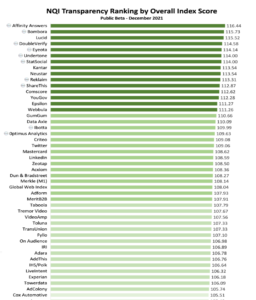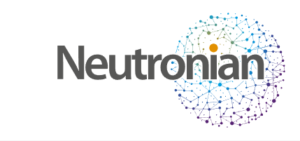

(TarikVision/Shutterstock)
The market for third-party data has exploded in recent years, giving companies an abundance of sources to choose from. That’s even more critical today in light of the demise of third-party cookies and Apple’s new privacy policy, which pummeled Facebook’s ads earnings. However, with thousands of data providers, the data buyer has little information to go on. That’s where a startup named Neutronian comes in.
The data buyer wonders: Is the data accurate? Was it obtained legally? Has it been secured? Does it comply with industry regulations? And above all, will it actually move the needle on my marketing campaign?
Neutronian was founded by data veterans from AWS and Comscore to answer these very questions. The Menlo Park, California company created the Neutronian Quality Index (NQI) to provide marketers with insight into the third-party data being sold on the open market (which is now often called first-party data, but more on that later).
“As a marketer, if you’re taking your most precious asset–light sweet crude–and you’re mixing that with lower quality crude oil, you should want to know about that,” says Neutronian CEO and co-founder Timur Yarnall. “We think there’s going to be a lot of interest and attraction there.”
Neutronian scours the Web to gather information about the data sellers and their products, which is reflected in the NQI. The data is ranked along five axes, including:
- Consent and compliance: Did users give the data gatherer consent? Does it comply with regulations like GDPR and CCPA?
- Sourcing transparency: Is it clear where the data originates from? Are you willing to put your brand’s reputation on the line for this?
- Dataset characteristics: Has the data been reviewed? Have basic data quality measures, like removing obviously invalid traffic, taken place?
- Methodology & Processing: How was it modeled and stored? Is it ready for consumption by data scientists? Is it secure?
- Performance: How does the dataset perform against a benchmark?
Yarnall compares Neutronian to the ratings services that Wall Street uses to help price equities. “Just like Moody’s, we’ll rate a bond offering, then we’ll sell analytics to a bond buyer,” he says. “What we do is we rate data sellers–and that’s a broad swath, with hundreds to thousands–and then we sell the results and the analytics to the marketer.”
Neutronian has two types of scores: one that’s public that’s done without the permission of the data sellers, and another more in-depth review that the data sellers pay for.
“Last month [December 2022] we published the first ranking of data providers out in the ecosystem. We call it Neutronian Transparency Ratings,” Yarnall says. “We rated 150 data providers. That was generally without their permission. We found everything we could about them publicly and scored that against the methodology.
“The next level we do is with the data provider’s cooperation or their request,” he continues. “We charge them a license fee for that certification or that audit. We’ve announced 10 to 12 certified providers so far, and many more are in the pipeline.”
With the demise of third-party cookies, companies are feeling the pinch to get more data to fuel their marketing operations. Apple’s decision to switch from an opt-out model for personal data disclosure to an opt-in model is also roiling the data market, as we saw with Facebook parent Meta’s shocking earnings miss, which sent its shares tumbling by 24% today.

A segment of the top-scoring data providers in the recent Neutronian Data Transparency Ratings (Source: Neutronian)
According to Yarnall, companies have two options: They can team up with the Web giants for marketing data, which works from a scale perspective but leaves companies at the whim of the Web giants. Or they can venture out on their own and forage for their own data.
“That’s the name of the game right now,” Yarnall says. “If you don’t want to be entirely dependent on Facebook, Google, and Amazon, you better take your first party data and you better mix and match with other high quality data. I think that’s important because there’s gradations of first-party data and there’s flavors of quality.”
Some very well-known data providers didn’t score particularly well on the Neutronian Transparency Ratings, which ranked about 150 data providers (which will soon be expanded to thousands, Yarnall says). 84.51, the Cincinnati-based data provider owned by Kroger, ranked ninth from last. Amazon Advertising, Nielsen, and Visa all were in the bottom quintile. Comscore and YouGov, by comparison, were near the top, along with Twitter, Mastercard, and Acxiom.
The Transparency Ratings reflect how difficult it was for the company to gain insight into how the data was gathered, Yarnall says.
“What we’ll do for example is we’ll score their consent mechanisms,” he says. “We’ll look at how easy their consent is to find or not find. We’ll look at their terms of service, privacy policies. We’ll also look at founder and executive experience. Obviously, Acxiom would have relevant experience. But as a consumer, how easily can I find the op-out mechanisms? We’ll score that.”
Some companies have ridiculously invasive opt-out mechanism. “Infutor requires a California resident to give a Social Security number to opt out of their data harvesting, which is just crazy,” Yarnell says. “I’m not talking about a subject access request. That’s a different story.”
The hope for data providers who sign up for Neutronian’s certification process is that a good data quality and transparency score will help it sell more data. The certification process also involves running the data through performance testing, which should give the data buyer an even better idea of what they’re buying.
“We’ll get a data sample, look at it in a match test, and check it for accuracy,” Yarnall says. “We’ll also have buy-side partner who will test the data in a campaign so they do an A-B test to see how it performs versus a comparable data provider or with no targeting.”
While the data at issue is, from a practical perspective, “third party” data, the industry has taken to calling it “first party” data now because it has the stamp of approval of the user, via the consent mechanism. That doesn’t change the fact that, when your company buys this data from third-party vendor, it is, from a practical perspective, third-party data.
Don’t let semantics fool you, Yarnall says.
“What we’re seeing is a strong shift to desire for ‘first party’ data,” he says (the quotation marks were his). “There’s not too many folks out there will ‘admit’ that they’re using third-party data. Everyone has shifted to saying we’ve only got first-party, consented data….I think the term third-party data now has almost become like a dirty word that nobody wants to use. So everyone is kind of changing the definition of what first-party data is.”
With hundreds of data sellers offering their products around the Web, the need for industry standards is only growing, Yarnall says. When data quality is more of a known quantity between the buyers and the sellers, it will only help grease the wheels for the free and open flow of data as a commodity.
“If you look at the New York Stock Exchange in the 1920s, it was very similar situation,” Yarnall says. “You had companies that were selling their stock. They didn’t even have to get audited financials. Who knew what you’re getting?”
There’s a direct parallel between the Roaring 20s of last century to what we’re going through today. “What we’re trying to be is like that GAAP [generally accepted accounting principles] audit standard, so that markets function with more trust and ultimately function more efficiently and it leads to growth for high quality data providers.”
Neutronian has published its methodology in a white paper and welcomes input. Yarnall , who co-founded MdotLabs, which was acquired by Comscore in 2014, welcomes an open debate on the topic.
“All my ideas and opinions are in a fully published white paper,” Yarnall says. “I do have very strong opinions. The passion for me in launching this company is I see a lot of bad data causing problems for companies. I see it causing problems for our democracy. I’m very passionate about it.”
Related Items:
What’s Holding Us Back Now? ‘It’s the Data, Stupid’
Data Integrity a Major Concern, Precisely Says
From First to Third, and Alternative Too: A Guide to Data Types
Editor’s note: The article was corrected. Infutor is the company that requires California residents to submit a Social Security number to opt out of data harvesting, not InFuture. Datanami regrets the error.
April 25, 2025
- Denodo Supports Real-Time Data Integration for Hospital Sant Joan de Déu Barcelona
- Redwood Expands Automation Platform with Introduction of Redwood Insights
- Datatonic Announces Acquisition of Syntio to Expand Global Services and Delivery Capabilities
April 24, 2025
- Dataiku Expands Platform with Tools to Build, Govern, and Monitor AI Agents at Scale
- Indicium Launches IndiMesh to Streamline Enterprise AI and Data Systems
- StorONE and Phison Unveil Storage Platform Designed for LLM Training and AI Workflows
- Dataminr Raises $100M to Accelerate Global Push for Real-Time AI Intelligence
- Elastic Announces General Availability of Elastic Cloud Serverless on Google Cloud Marketplace
- CNCF Announces Schedule for OpenTelemetry Community Day
- Thoughtworks Signs Global Strategic Collaboration Agreement with AWS
April 23, 2025
- Metomic Introduces AI Data Protection Solution Amid Rising Concerns Over Sensitive Data Exposure in AI Tools
- Astronomer Unveils Apache Airflow 3 to Power AI and Real-Time Data Workflows
- CNCF Announces OpenObservabilityCon North America
- Domino Wins $16.5M DOD Award to Power Navy AI Infrastructure for Mine Detection
- Endor Labs Raises $93M to Expand AI-Powered AppSec Platform
- Ocient Announces Close of Series B Extension Financing to Accelerate Solutions for Complex Data and AI Workloads
April 22, 2025
- O’Reilly Launches AI Codecon, New Virtual Conference Series on the Future of AI-Enabled Development
- Qlik Powers Alpha Auto Group’s Global Growth with Automotive-Focused Analytics
- Docker Extends AI Momentum with MCP Tools Built for Developers
- John Snow Labs Unveils End-to-End HCC Coding Solution at Healthcare NLP Summit
- PayPal Feeds the DL Beast with Huge Vault of Fraud Data
- Will Model Context Protocol (MCP) Become the Standard for Agentic AI?
- OpenTelemetry Is Too Complicated, VictoriaMetrics Says
- Thriving in the Second Wave of Big Data Modernization
- Google Cloud Preps for Agentic AI Era with ‘Ironwood’ TPU, New Models and Software
- Google Cloud Fleshes Out its Databases at Next 2025, with an Eye to AI
- Can We Learn to Live with AI Hallucinations?
- Monte Carlo Brings AI Agents Into the Data Observability Fold
- AI Today and Tomorrow Series #3: HPC and AI—When Worlds Converge/Collide
- The Active Data Architecture Era Is Here, Dresner Says
- More Features…
- Google Cloud Cranks Up the Analytics at Next 2025
- New Intel CEO Lip-Bu Tan Promises Return to Engineering Innovation in Major Address
- AI One Emerges from Stealth to “End the Data Lake Era”
- GigaOM Report Highlights Top Performers in Unstructured Data Management for 2025
- SnapLogic Connects the Dots Between Agents, APIs, and Work AI
- Snowflake Bolsters Support for Apache Iceberg Tables
- Supabase’s $200M Raise Signals Big Ambitions
- Big Data Career Notes for March 2025
- GenAI Investments Accelerating, IDC and Gartner Say
- Dremio Speeds AI and BI Workloads with Spring Lakehouse Release
- More News In Brief…
- Gartner Predicts 40% of Generative AI Solutions Will Be Multimodal By 2027
- MinIO: Introducing Model Context Protocol Server for MinIO AIStor
- Dataiku Achieves AWS Generative AI Competency
- AMD Powers New Google Cloud C4D and H4D VMs with 5th Gen EPYC CPUs
- CData Launches Microsoft Fabric Integration Accelerator
- MLCommons Releases New MLPerf Inference v5.0 Benchmark Results
- Opsera Raises $20M to Expand AI-Driven DevOps Platform
- GitLab Announces the General Availability of GitLab Duo with Amazon Q
- Seagate Unveils IronWolf Pro 24TB Hard Drive for SMBs and Enterprises
- Intel and IBM Announce Availability of Intel Gaudi 3 AI Accelerators on IBM Cloud
- More This Just In…





























